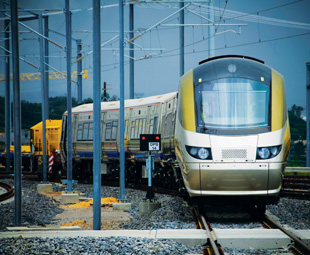Difference of opinion

VAUGHAN MOSTERT responds to Andrew Marsay’s letter (below)
In his CV at sbs.co.za, Marsay describes himself as “passionate about improvements in the quality of transport infrastructure investment decision-making in Africa”. My passion is a lot simpler – “fixing public transport” – so we are probably talking past each other here…
Marsay was also a transport and economic development adviser with Arup, the same company that “certified” the Gautrain. In Business Day of November 5, 2005, both he and the Gautrain’s boss, Jack van der Merwe, wrote articles loaded with construction industry “sound bites” supporting the scheme. His article included this: “A successful Gautrain project will ultimately be a success for all public transport”.
At the time I had no idea what that meant – I still don’t – but 11 years later, a good cartoonist should draw a picture showing happy Gautrain passengers looking out of the windows while the train flies through the air “rising above the existing challenges”, while, on the road below, a minibus has just crashed; with crying children, bodies under sheets and ambulances on the scene. Further along the road sits an old man (me?) at a bus shelter, both are covered in cobwebs waiting for a bus that will never arrive.
During the last decade, the South African economy has been wheeled into the intensive care unit (ICU) partly because of the questionable relationships between government, parastatals and others. Sadly, Marsay’s comments contribute little to the subject.
In response to his comments:
• I do not hanker after a past golden era … there has never been such a thing in South African transport history. Until about 1970, the minority white population enjoyed reasonable public transport, while the black majority had to put up with the fourth-rate conditions that apply to everybody today.
I do, however hanker after a future golden era. None of the many suggestions I have made to improve the situation require new road or rail construction, or even new vehicles. They simply involve better use of existing resources, which should be national transport policy in an economy on life support.
That seems to irritate some people in the infrastructure business, who would rather build wider freeways, fast rail and bus lanes than more worthy things like houses.
• I did not “pick on” ride-sharing. I did, however make it clear that millions of low-paid workers in South Africa cannot rely on ride-sharing and cycle paths to get to work. (One plus for ride-sharing – now that it is freely available, how about cancelling the licences of bad drivers instead of imposing Mickey Mouse fines?)
Marsay’s vision of happy liberated housewives and tourists scooting around in hired cars is quite touching, but I suggest that readers visit the websites humantransit.org and whosdrivingyou.org for a more realistic view of ride-sharing worldwide.
Let’s fix our overtraded minibus-taxi industry first, before an overtraded ride-sharing industry also starts exchanging gunfire. Try suggesting to the Passenger Rail Agency of South Africa (Prasa) and those at the Gautrain that ride-sharing can do the job as well as they can!
• Marsay is a Bible-quoting supporter of e-tolling (The Star, January 14, 2014), so I’m surprised that he uses capital letters to repeat the falsehood that “Gauteng DOES have a transport plan”.
There WAS one, but it was vague, unimplementable and contradictory to itself. That is what happens when a transport plan is signed off by a compliant committee chaired by the same person who heads the Gautrain. No ethical problems there Marsay?
To its credit, the plan DID say that the best way to serve low-density urban deserts is with good road-based public transport. Throwing fast rail at the problem, without first fixing road services, will help to keep the South African economy in ICU for a long time.
• As for King Shaka Airport, the gridlock north of Durban is, like almost everywhere else in the country, due in large part to the complete absence of decent scheduled (yes, boring old schedules set in stone) public transport.
Let’s start with a half-hourly bus service from the Durban central business district to Gateway shopping centre, with every second bus continuing to the airport. Like my suggested service from Stellenbosch to Cape Town airport, it won’t contribute much, but it will be a start. Even Prasa’s head of planning, Hishaam Emeran, would half-agree with me (Engineering News December 16, 2016). He wants a “dedicated” bus service – for now I’d settle for an all-stops one.
I would urge Marsay to consider whether platitudes like: into alignment, provides a framework, courageous commitment, bold investments, see if a public private partnership will work, aligning financial cost, and so on, take us anywhere nearer a solution. I don’t think so.
Andrew Marsay writes:
Here are my thoughts on Vaughan Mostert’s piece in your November issue.
My friend Vaughan writes as sharply as ever in his column. As usual, he is hankering after a past golden era of public transport when bus (and trolley-bus!) schedules were set in stone and passengers could not only get to work reliably without private cars, but even set their watches by the arrival of their faithful bus.
In this particular FOCUS article Vaughan picks on Uber for “having limited impact in developing countries – including South Africa”; the Gautrain for pretending that Gauteng has a 25-year Transport Plan and making up non-existent economic benefits to hide the fact of its low benefits; and eThekwini for dreaming about an untested fast-rail line linking King Shaka Airport to the city centre.
Here is another take on each of these items:
• Johannesburg is Uber’s globally fastest growing market. It is creating thousands of flexible jobs for people previously in dead-end employment. It is allowing hundreds – maybe thousands – of suburbanites to leave a car at home, or even sell their second car, because of the incredible flexibility and reliability that the Uber service it offers.
Housewives and working mothers are being liberated from the daily grind of interrupting their productive activities by the dreaded afternoon school run. International visitors now find that Johannesburg is being transformed from a place where you (sometimes literally!) took your life in your hands when you rode in a taxi, to becoming a normally functioning, easily accessible international metropolis.
• Gauteng DOES have a 25-year Transport Plan, even though it doesn’t meet Vaughan’s criterion of being a set of cast-iron, fully funded, no-go-back institutional commitments. It is a plan that seeks to progressively bring land use planning and transport planning into alignment over the long-term.
It provides a framework for a future in which unrestricted expansion of the road network gives way to a better balance between private and public transport modes.
Yes, it is going to need courageous commitments to make it work. It may require that road-pricing (tolling) be revisited in order to enable bold public transport investments to realise more viable patronage levels. (His comments about Cape Town wanting to have its cake and eat it with regard to re un-tolled roads AND good public transport shows that we are potentially in agreement on this point at least.)
• Yes, making the Gauteng 25-year Transport Plan work will require finding ways of placing real economic value on the concept of sustainable urban form – value that conventional cost/benefit analysis cannot envisage, let alone capture in ways that will help motivate the sorts of public transport investments that will change our low-density urban deserts into proper functioning cities.
• Last, Vaughan’s criticism of the plan to spend R23 billion on a fast-rail line to King Shaka airport fails to note that the proposed study of this project is briefed to first test the demand, then advise what transport technology fits the bill; and only if the answer is a rail link, to see if a Gautrain-like PPP might work.
Looking forward to our next dinner debate Vaughan!
Andrew Marsay
Transport Economist
Vaughan Mostert lectured on public transport issues at the University of Johannesburg for nearly thirty years. Through Hopping Off, Mostert leaves readers with some parting food for thought as he continues his push for change in the local public transport industry.
Published by
Focus on Transport
focusmagsa




